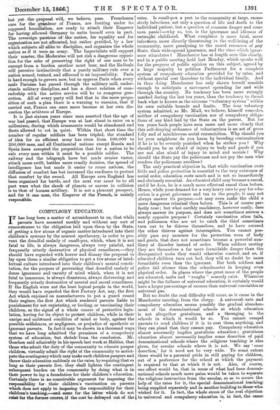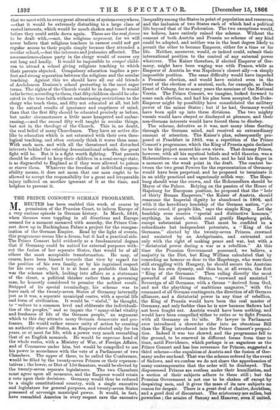COMPULSORY EDUCATION.
TT has long been a matter of astonishment to us, that while
parents have assented meekly and without any sort of remonstrance to the obligation laid upon them by the State, of getting a few atoms of organic matter introduced into their children's systems by the nearest apothecary, in order to pre- vent the dreadful malady of small-pox, which, when it is not fatal to life, is always dangerous, always very painful, and frequently utterly destructive of physical comeliness,—they should have regarded with horror and dismay the proposal to lay upon them a similar obligation to get a few atoms of intel- lectual culture introduced into their children's mental consti- tution, for the purpose of preventing that dreadful malady of dense ignorance and vacuity of mind which, when it is not fatal to innocence, is always disastrous, always distressing, and frequently utterly destructive of mental and moral comeliness. If the English were not the least logical people in the world, they would have regarded the first Factory Act, nay, the first Act which enjoined on manufacturers to put a guard round their engines, the first Act which rendered parents liable to punishment for not registering, or feeding, or vaccinating their children, as. the signal of a whole course of protective legis- lation, having for its object to proteet children, while in their unripe and unframed condition of imind or body, against the possible selfishness, or negligence, or prejudice of apathetic or ignorant parents. In fact it may be shown in a thousand ways that we have long admitted the premisses of a compulsory system of education, but shrink"from the conclusion. Mr. Goschen said admirably in his speech last week at Halifax, that those who admit the duty of the community to educate pauper children, virtually admit the right of the community to antici- pate the contingency which may make such children paupers and throw their education suddenly on the rates, by requiring that so long as their parents live, they shall lighten the contingent subsequent burden on the community by doing what is in their power to lay a foundation for their children's education. Certainly there is no conceivable argument for imposing the responsibility for their children's vaccination on parents which does not apply to imposing the responsibility for their children's teaching,—and some for the latter which do not exist for the former course, if the cost be defrayed out of the rates. Is small-pox a pest to the community at large, exces- sively infectious, not only a question of life and death to the individual patient, but a question of common danger and coin- ru.on panic?—why so, too, is the ignorance and idleness of untaught childhood. What complaint is more fatal, more infectious, more directly threatening to the well-being of the community, more paralyzing to the moral resources of ,any State, than wide-spread ignorance, and the vices which ignor- ance stimulates ? Manchester has at length seen this clearly, and in a public meeting held last Monday, which speaks well for the progress of public opinion on this subject, agreed by a large majority to petition Parliament for a complete system of compulsory. education provided for by rates, and without special cost therefore to the individual family. And in thus doing Manchester has only shown herself sensible enough to anticipate a movement spreading far and wide through the country. No tendency has been more strongly marked during the last ten years, than the tendency to thrust back what is known as the extreme "voluntary system" within its own, suitable bounds and limits. The true voluntary system admitted, as Mr. Miall, we believe, himself concedes, neither of compulsory vaccination nor of compulsory obliga- tions of any hind laid by the State on the parent. But for ten years back people have seen more and more clearly that this self-denying ordinance of voluntaryism is an act of gross folly and of mischievous social renunciation. Why should you let your neighbour do you harm by breeding contamination if he is to be severely punished when he strikes you ? Why' should you be so afraid of injury to body and goods if you are not also afraid of injury to mind and morals ? Why should the State pay the policeman and not pay the man who renders the policeman needless ?
The only practical objection is, that while vaccination costs little and police protection is essential to the very existence of social order, education costs much and is not so immediately and obviously essential. An educated child may become a rascal, and if he does, he is a much more effectual rascal than before. Hence, while your demand for a very heavy rate to pay for edu- cation is a great grievance and tax to the people, it may not always answer its purpose,—it may even make the child a more dangerous criminal than before. This is of course per- fectly true ; but what earthly machinery, however costly, does always answer its purpose, and dose not 'sometimes answer a. nearly opposite purpose ? Certainly vaccination often fails, and policemen who are set to catch the thief sometimes, turn out to be thieves themselves, and to have secured the other thieves against interruption. You cannot pos- sibly pass any measure for the protection even of body and goods, that does not sometimes become a powerful aux- iliary of disorder instead of order. When soldiers mutiny they are themselves a far more formidable danger than the disorganized mobs they would otherwise control, and so, if educated children turn out bad, they will no doubt be more formidable even than the ignorant. But both soldiers and police fail oftener than the schoolmaster in keeping even physical order. In places where the great mass of the people are educated, mobs and " roughs " scarcely exist. Whatever might be the failures of universal education, it certainly would have a larger per-centage of success than universal constables or universal gas.
But no doubt the real difficulty will come, as it came in the. Manchester meeting, from the clergy. A universalrate and compulsory education means possibly the gradual abandon- ment of the denominational schools at which education is not altogether gratuitous, and a thronging to the schools in which it would be so. You cannot compel parents to send children if it is to cost them anything, and they can plead that they cannot pay. Compulsory education, almost necessarily implies gratuitous education ; gratuitous, education almost necessarily implies some desertion of paid denominational schook where the religious teaching is also given, for secular schools where it is not. We say 'some desertion,' for it need not be very wide. To some extent there would be a parental pride in still paying for children, out of a preference for the school at which the payment is required to that at which it is not. Also, of course, one effect would be, that in some of what had been denomi- national schools much more pains would be taken to separate
the religious instruction from the secular, so as to secure the help of the rates for it, the special denominational teaching
being supplied separately and in another building to those who wished for it. In fact, the whole stress of the real objection to universal and compulsory education is, in fact, the same
that we meet with to everygreat alteration of systemeverywhere, —that it would be extremely disturbing to a large class of vested interests, which would be much shaken and tossed about before they could settle down again. These are the real forces to be dealt with,—not, the religious argument, for we will never believe that religious teachers in earnest could not get regular access to their pupils simply because they attended a secular school,—but the interests and jealousies affected. The no-conscience-clause party in the clergy would of course cry out long and loudly. It would be impossible to compel child- ren to attend a school giving religious teaching to which their parents objected. Compulsory education implies a per- fect and strong separation between the religious and the secular teaching. Against this we should have all our old friends of Archdeacon Denison's school protesting in the most eager terms. The rights of the Church would be in danger. It would be farbetter, according to them, that fifty children should be edu- cated in the true faith without embarrassing restrictions to the clergy who teach them, and fifty not educated at all, but left to the natural results of ignorance and emptiness of mind, than that the first fifty should be educated precisely as before, but under circumstances a little more hampered and embar- rassing,—and the second fifty well taught in secular things, but not in the theology of the Church. This is, no doubt, the real belief of many Churchmen. They have an active dis- like to education which is not saturated with their own theo- logical teaching, and often seriously think it worse than none. With such men, and with all the threatened and disturbed interests behind the existing denominational schools, the great fight will be. But it is a fight worth fighting. That parents should be allowed to keep their children in a semi-savage state, is as disgraceful to England as if they were allowed to poison or starve them. Whatever the freedom of individual respon- sibility means, it does not mean that one man ought to be allowed to accept the responsibility for a great and irreparable injury inflicted on another ignorant of it at the time, and helpless to prevent it.



































 Previous page
Previous page